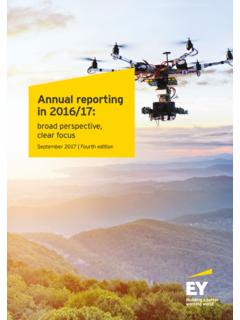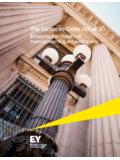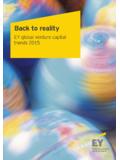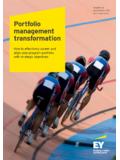Transcription of As FinTech evolves, can financial services …
1 As FinTech evolves , can financial services innovation be compliant? The emergence and impact of regulatory sandboxes in the UK. and across Asia-Pacific FinTech : organizations combining innovative business models and technology to enable, enhance and disrupt financial services . 3. Contents Introduction Governments striving for optimal FinTech regulation 4. Navigating FinTech regulation across Asia-Pacific 7. How regulatory sandboxes work 10. Inside the FCA's regulatory sandbox 13. Regulatory sandboxes in Asia-Pacific 17. Supporting FinTech Innovators 23. Contacts 24. Introduction A significant increase in the number of financial Recognizing the difficulty of innovating without technology ( FinTech ) firms, and corresponding certainty, many regulators in the Asia-Pacific venture capital and corporate investment in the (APAC) region are starting to follow the global sector, is sure to have a profound impact on the trend of developing a regulatory sandbox.
2 In a evolution of the financial services industry. regulatory sandbox, traditional and non-traditional financial institutions are able to test new According to the 2017 EY FinTech Adoption Index, technologies and business models in a live but FinTech has already been embraced by the controlled environment, giving regulators time to mainstream. Across the 20 markets in the EY study, adapt legislation as needed. 33% of digitally active consumers are making use of FinTech products and While the UK leads This collaborative approach has the potential to in developed markets, consumers in China have the be a highly effective way to take FinTech to market highest level of FinTech adoption, with 69% of safely, in a manner that promotes consumer respondents regularly using these services , more confidence in the new offering.
3 However, not all than double the global average. This is having a sandboxes are created equal, with different follow-on effect in other parts of Asia-Pacific. markets demonstrating varying levels of Leading Chinese FinTech players are impacting the commitment in line with market-specific objectives surrounding markets directly, through international and policy regimes. Innovators interested in global market entry, outbound investment and partnering; mobility must have a clear understanding of not and indirectly, as FinTechs in other countries seek to just their local geography, but also how other replicate aspects of their success in local markets. countries are regulating FinTech offerings, given similarities of regulatory regime in some countries. The rise of FinTech requires regulators to understand how to best apply regulatory principles This report examines regulatory considerations to new settings created by new technologies and pertaining to FinTech innovation , as well as the business models.
4 For example, regulators may different approaches being taken by regulators need to consider how to perform client due across the APAC region. Our primary focus is diligence in remote account opening environment regulatory sandboxes, starting with how these via mobile banking, or how to ensure investment collaborative endeavors work and the experiences suitability when investors rely on robo-wealth of five companies in the first cohort innovating advisors. Unless clear guidelines and precedents inside the pioneering environment offered by the are provided or a means for running controlled UK's financial Conduct Authority (FCA) sandbox. experiments can be allowed, these new This report also tracks the progress of APAC's applications enabled by FinTech can create regulatory sandboxes, which since September regulatory ambiguity.
5 2016 have been progressively established in Hong Kong, Thailand, Malaysia, Singapore, Therefore, regulatory clarity is of critical Australia, and Indonesia. importance to FinTech innovators. Regulations can impact anything from how money can be We hope that this report will help FinTech raised, to how advice can be given or how a service innovators and their partners to understand may be delivered. Unless innovators understand market-by-market differences and the likely the regulatory context, it is almost impossible to evolution of APAC's regulatory sandbox bring compliant services to market. environment as well as best way to navigate these changes. 1 . Our latest research in 2017 is based on more than 22,000 online interviews in 20 markets. Our surveyed population is drawn from a demographically representative sample of each market to the extent available, and all references to consumers relate to individuals who are active online, which we refer to as digitally active.
6 Index-2017/$ As FinTech evolves , can financial services innovation be compliant? 3. Governments striving for optimal FinTech regulation Regulatory clarity is critical for FinTech 's mass adoption. Governments know that FinTech has the potential to deliver economic benefits, by lowering the cost of operations and enhancing competition, and societal benefits, by boosting financial inclusion and delivering more convenient financial services . As a result, regulators around the world are targeting optimal regulation an environment that encourages providers to harness emerging technologies without weakening the financial system or eroding consumer protections. This attitude is common to all markets, regardless In China, a country that has often taken a more of the maturity of existing financial regulations.
7 Passive approach to financial services regulation, The UK's financial Conduct Authority (FCA), regulators are increasingly optimizing various created in April 2013 during the wake of the aspects of the regulatory environment. This global financial crisis, has fostered a collaborative involves making regulation both more robust and relationship with innovators in the financial more collaborative with industry participants. For services industry to ensure both consumer example, in terms of strengthening FinTech protection and market competition. In 2015, regulation, after several fraud incidents, the the FCA launched the world's first regulatory People's Bank of China (PBOC) has imposed sandbox for FinTech startups at its London stricter measures on peer-to-peer (P2P) lending. headquarters, allowing innovations to be tested This is in the wake of scandals such as Ezubao, under controlled conditions set and monitored which used guaranteed interest rates to attract directly by the regulator.
8 The UK, already one more than RMB50 billion from 900,000 investors, of the world's most mature financial regulatory but abused their trust in high-risk investments. environments, is now an established FinTech hub. As elsewhere, regulators in China are also actively investigating the potential of replicating the regulatory sandbox approach to more closely manage FinTech development. 4 As FinTech evolves , can financial services innovation be compliant? FinTech adoption rates 69%. across our 20 markets Notes: The gures show FinTech users as a percentage of the digitally active population. 52%. All gures are shown in percentages. *Belgium and Luxembourg ** Hong Kong SAR of China 42%. 13%. 14% 40%. 18%. 37%. 23%. FinTech 26% adoption 37%. at a glance 27% 36%. 27%. 35%. 30% 35%. 32% 32% 33%. Average adoption Source: EY FinTech Adoption Index 2017 33%.
9 While London, New York and Silicon Valley compete to position themselves as global FinTech hubs, China has leapfrogged ahead and was ranked top of the 2017 EY FinTech Adoption Index. As detailed in The Rise of FinTech in China, co-authored by EY and DBS Bank, the country's facilitative regulatory environment has been conducive to the tremendous growth of non-traditional financial services Key growth areas have included third-party payment applications, alternative finance, and mutual funds. Now, the Chinese Government is implementing additional regulations affecting non-traditional lenders and payment providers, as well as asset managers, to ensure a sustainable and innovative Internet Plus economy. 2 . $ As FinTech evolves , can financial services innovation be compliant? 5. FinTech raises new regulatory questions Banks and other incumbent financial institutions are keen to Answering these questions is further complicated by issues assess the viability of new FinTech opportunities, but are often such as: constrained by regulatory uncertainty caused by the new questions raised by unconventional business models.
10 To take Uncertainty of new technology/business models . just two of many possible examples: , blockchain offers multiple different use cases, from digital currencies to initial coin offerings as a means of Crowdfunding: If a listed company wishes to raise money raising capital. from public (crowdfunded) sources, what level of disclosure Contradiction with existing regulations , in its bid should it follow? If a high level of disclosure is required, given to provide low-cost financial advice and improve financial the cost of independent assessment, would crowdfunding be inclusion, robo-advisory might undermine client suitability an attractive means of raising capital? If the disclosure protections if the process is optimized exclusively for requirement is low, how will regulations protect investors digital channels.









